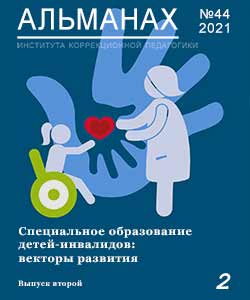Special education of disabled children: development vectors
Almanac #44 · Issue #2 · 2021

State Policy of the Russian Federation on Health Care and Protection of the Rights of Disabled Children in 1990-2000: On the Dynamics of Priorities
The main directions and priorities of state policy in the Russian Federation to protect the health and rights of children with disabilities over the past twenty years were chosen as the subject of the study.
The authors examine in detail such aspects of the topic as priorities in the sphere of health care and protection of the rights of children with disabilities, and trends in the development of state policy. Particular attention is paid to the problems and results of its reform. It is emphasized that public policy remains the main public mechanism in the definition, categorization and legalization of disability, allows to maintain the possibility of dialogue between generations, providing a balanced combination of traditions and innovations in the understanding of modern social relations in relation to children with disabilities.
The methodological basis of the study consists of the principles of historicism, scientific objectivity, consistency and comprehensiveness, which allow us to study the experience and contemporary problems of forming and implementing state policy of the Russian Federation in the field of health care and protection of the rights of children with disabilities as a complex problem, analyzing the factual material in its entirety and interconnection.
The main conclusions of the conducted study are the specific features of the evolution of the priorities of the state policy of the Russian Federation on health protection and protection of the rights of children with disabilities in the framework of two stages: 1991-2001 and 2001-2020.
Keywords
State Policy of the Russian Federation on Health Care and Protection of the Rights of Disabled Children in 1990-2000: On the Dynamics of Priorities
public policyhealth care
children with disabilities
protection of rights
legislative initiatives
Psychological and pedagogical rehabilitation of disabled children in boarding houses of the social security system: from purpose to practice
Keywords
Psychological and pedagogical rehabilitation of disabled children in boarding houses of the social security system: from purpose to practice
Psychological and pedagogical rehabilitation of disabled children in boarding houses of the social security system: from purpose to practice Publisher: Almanac of the institute of special educationDirections of psychological assistance to disabled children with kidney disease at the stage of dialysis and after transplantation
Keywords
Directions of psychological assistance to disabled children with kidney disease at the stage of dialysis and after transplantation
chronic kidney diseasepsychological support
disabled children
medical psychology
high-tech medical care
social pediatrics
Innovations in teaching disabled children with progressive diseases and uncertain life prognosis
The article presents the problem of organizing systematic education of children with progressive diseases that limit life expectancy.
It is shown that the basis for the provision of medical, social and psychological-pedagogical assistance to a child with a progressive disease limiting life expectancy is the need to create conditions for high-quality and full-fledged living for him every remaining day, taking into account his current psychophysical capabilities.
The paper also presents the experience and approaches of the Federal project of hospital schools of Russia "We Teach/The Learn" for teaching children receiving palliative care.
The paper also presents the experience and approaches of the Federal project of hospital schools of Russia "We Teach/The Learn" for teaching children receiving palliative care.
Keywords
Innovations in teaching disabled children with progressive diseases and uncertain life prognosis
Childpalliative care
education
learning
hospital school
hospice
Psychological support of a chronically ill child and his family at different stages of inpatient treatment
The article presents in the form of a clinical case the organization of psychological assistance to a teenager with a severe form of Crohn's disease during the period of long-term hospital treatment (within three months).
Crohn's disease is a severe chronic immune-mediated inflammatory disease of the gastrointestinal tract, which can affect all its parts. The recurrent course of the disease is the basis for assigning the disabled status to the child, because the condition leads to limitation of life and significantly changes the lifestyle of the child and his family.
The tasks and content of psychological assistance to a chronically ill child are set out taking into account the severity of his physical condition and the stage of treatment. The specifics of the work of a psychologist in intensive care, the department of surgery and a somatic hospital are shown.
Keywords
Psychological support of a chronically ill child and his family at different stages of inpatient treatment
Crohn's diseasespecial psychological needs
disabled children
complex rehabilitation
interdisciplinary approach
psychological assistance
social adaptation.
Dynamics of cognitive development of children with disabilities as a criterion of social adaptation prospects in adulthood
Keywords
Dynamics of cognitive development of children with disabilities as a criterion of social adaptation prospects in adulthood
special educationintellectual disability
special educational needs
children with disabilities
educational route
social adaptation
severe multiple developmental disabilities
Topical issues of training nurses to work with disabled children and children with disabilities in educational institutions
Keywords
Topical issues of training nurses to work with disabled children and children with disabilities in educational institutions